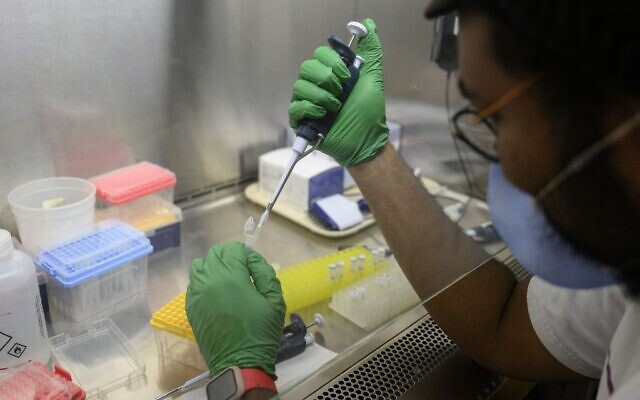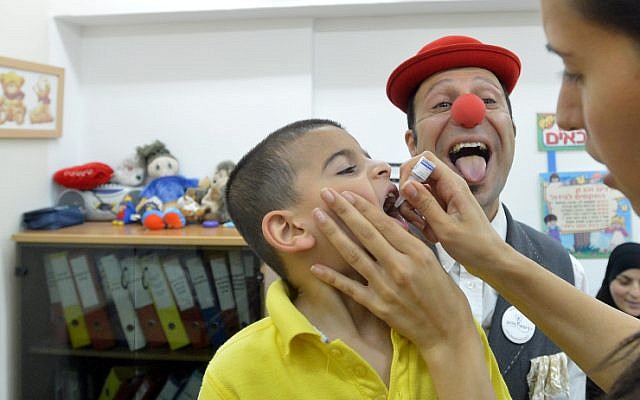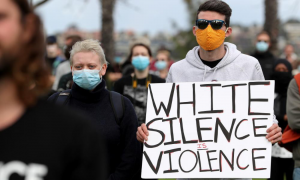UN body removed strain from oral prophylactic in 2016, leaving children vulnerable to vaccine-derived viruses circulating silently, with over 3,300 paralyzed by disease since

LONDON — The baby in Gaza who was recently paralyzed by polio was infected with a mutated strain of the virus that vaccinated people shed in their waste, according to scientists who say the case is the result of “an unqualified failure” of public health policy.
The infection, which marked the first detection of polio in the war-torn Palestinian territory in more than 25 years, paralyzed the lower part of one leg in the unvaccinated 10-month-old child. The baby boy was one of hundreds of thousands of children who missed vaccinations because of the fighting between Israel and Hamas.
Scientists who have been monitoring polio outbreaks said the baby’s illness showed the failures of a global effort by the World Health Organization and its partners to fix serious problems in their otherwise largely successful eradication campaign, which has nearly wiped out the highly infectious disease. Separately, a draft report by experts deemed the WHO effort a failure and “a severe setback.”
The polio strain in question evolved from a weakened virus that was originally part of an oral vaccine credited with preventing millions of children worldwide from being paralyzed. But that virus, known as Type 2, was removed from the vaccine in 2016 in hopes of preventing vaccine-derived outbreaks.
Public health authorities knew that decision would leave people unprotected against that particular strain, but they thought they had a plan to ward off and quickly contain any outbreaks. Instead, the move resulted in a surge of thousands of cases.
Get The Times of Israel’s Daily Edition by email and never miss our top stories
By signing up, you agree to the terms
“It was a really horrible strategy,” said Columbia University virologist Vincent Racaniello, who was not involved with the report or the WHO. “The decision to switch vaccines was based on an incorrect assumption, and the result is now we have more polio and more paralyzed children.”
A draft copy of the report commissioned by the WHO and independent experts said the plan underestimated the amount of the strain in the environment and overestimated how well officials would be able to squash outbreaks.

The plan led to vaccine-linked polio outbreaks in 43 countries that paralyzed more than 3,300 children, the report concluded.
Even before the Gaza case was detected, officials reviewing the initiative to tinker with the vaccine concluded that “the worst-case scenario has materialized,” the report said.
The report has not yet been published, and some changes will likely be made before the final version is released next month, the WHO said.
The strain that infected the baby in Gaza had lingered in the environment and mutated into a version capable of starting outbreaks. It was traced to polio viruses spreading last year in Egypt, according to genetic sequencing, the WHO said.
In 2022, vaccine-linked polio viruses were found to be spreading in Britain, Israel and the US, where an unvaccinated man was paralyzed in upstate New York.

Scientists now worry that the emergence of polio in a war zone with an under-immunized population could fuel further spread.
The WHO said Thursday that it had reached an agreement with Israel for limited pauses in fighting in Gaza to allow for the vaccinations. The agency’s representative in the Palestinian territories said the first three-day pause would start Sunday in central Gaza. That will be followed by another three-day pause in southern Gaza and then another in northern Gaza. The pauses were to last eight or nine hours each day.
Racaniello said the failure to track polio carefully and to sufficiently protect children against the strain removed from the vaccine has had devastating consequences.
“Only about 1% of polio cases are symptomatic, so 99% of infections are silently spreading the disease,” he said.

The oral polio vaccine, which has reduced infections globally by more than 99%, is easy to make and distribute. Children require just two drops per dose that can be administered by volunteers. The oral vaccine is better at stopping transmission than the injected version, and it is cheaper and easier to administer.
But the weakened live virus in the vaccine can be shed by immunized kids in human waste, allowing it to circulate and eventually mutate into a form that can trigger outbreaks in unvaccinated people. In 2016, the WHO removed Type 2 from the vaccine, reasoning that the wild version had been eradicated, but leaving populations vulnerable to vaccine-derived outbreaks.
In Gaza, authorities will use a newer version of the oral polio vaccine that targets the problematic strain. The weakened live virus in the new vaccine is less likely to cause vaccine-derived outbreaks, but they are still possible.
Most wealthy countries, including the US, use an injected vaccine, which carries a dead virus and does not come with the risk that polio will be present in human waste. However, it does not prevent those who are vaccinated from spreading the virus around to others.

Racaniello said it was “unethical” that the WHO and its partners were using a vaccine that is unlicensed in rich countries precisely because it can increase the risk of polio in unvaccinated children.
Vaccine-linked cases now comprise the majority of polio infections in more than a dozen countries, in addition to Afghanistan and Pakistan, where transmission of the wild virus has never been stopped.
“This is the result of the Faustian bargain we made when we decided to use” the oral polio vaccine, said Dr. Paul Offit, director of the Vaccine Education Center at the University of Philadelphia. “If we really want to eradicate polio, then we need to stop using the vaccine with live (weakened) virus.”

The report’s authors faulted leaders at the WHO and its partners for being unable or unwilling “to recognize the seriousness of the evolving problem and take corrective action.”
WHO spokesman Oliver Rosenbauer acknowledged that the vaccine strategy “exacerbated” the risk of epidemics linked to the vaccine.
He said in an email that immunization “was not implemented in such a way to rapidly stop outbreaks or to prevent new strains from emerging.”

The WHO estimates that 95% of the population needs to be immunized against polio to stop outbreaks. The UN health agency says the rate has since dropped to below 90% of Gaza’s population.
Rosenbauer said not hitting vaccination targets was the biggest risk for allowing vaccine-linked viruses to emerge.
“You need to reach the children with the vaccines,” he said. “Regardless of which vaccines are used.”




